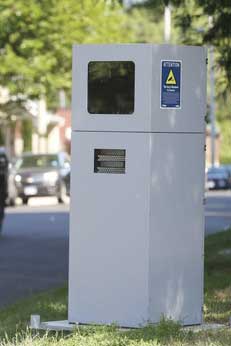Photo Radar – Automated Speed Enforcement
Photo Radar Speeding Tickets
In 2020, the Ontario government authorized the use of photo radar technology to enhance speed enforcement.
Photo radar cameras, are designed to autonomously detect and record speeding vehicles.
These photo radar systems function by using radar technology to measure the speed of moving vehicles. When a vehicle exceeds the speed limit, the camera is triggered to capture an image of the vehicle’s license plate. This process does not require the presence of a police officer or any operator at the site.
Commonly known as Automated Speed Enforcement (ASE) systems. Speeding tickets issued through these systems are automatically processed and mailed to last known address of the registered owner of the vehicle.
How Speed Cameras Work
When a vehicle travels past a speed camera, the integrated radar system inside the camera precisely measures the speed at which the vehicle is moving.
If the vehicle’s speed exceeds the prescribed speed limit for that area, the camera is triggered to capture a clear image of its license plate.
The speed camera diligently records the following details:
- The exact speed at which the vehicle was moving.
- The license plate number along with a visual of the vehicle itself.
- The specific date and precise time when the infringement occurred.
- The direction in which the vehicle was traveling at that moment.
All of this captured data, together with the photograph, is securely documented and saved within the camera’s internal storage system.
Photo Radar – Issuing the Ticket
After capturing data from the speeding vehicle, the details from the photo radar camera are checked by a Provincial Offences Officer.
The officer scrutinizes the data to ascertain the accuracy of the speeding violation.
Where the officer believes that the vehicle was speeding:
- The officer issues a speeding ticket, which provides information about the detected speed, the allowed speed limit, and the date and time of the violation.
- This ticket is subsequently mailed out to the registered address of the vehicle’s owner, making them aware of the infraction and the corresponding penalty.
Photo Radar Penalties
Penalties associated with photo radar tickets are comparable to those given for parking infractions. Specifically, this means:
- Penalties are restricted to financial fines.
- The driver does not receive any demerit points.
- The violation does not manifest on the driver’s official driving history.
- The infraction is registered to the vehicle itself, rather than the individual driver at the time of the offence.
The photo radar ticket solely imposes a fine, targeting the vehicle and its owner, without affecting insurance premiums or accruing demerit points.
Enforcement of Photo Radar Tickets
As of 2022 the provincial government has removed the fee to renew a vehicles licence plate.
Subsequently for persons who decide not to pay the fine, there is no current enforcement, other than a late fee.
Upon selling or buying a new vehicle the fine would have to be paid before a new licence plate would be issued.
Insurance Implications
There are no insurance implications for photo radar tickets. Photo radar tickets do not affect insurance rates.
Photo radar tickets do not go the owners driving records or insurance, nor are insurance providers given access to the information.
The reason photo radar tickets are not associated to the driver is because, the driver is not identified by the camera system, only the vehicle.
Photo Radar – Plate Denial
Photo radar tickets are issued to the owner of the motor vehicle, the penalty goes against the vehicle, not the driver.
Where the owner refuses or neglects to pay the fine, the fine is then placed upon the vehicle licence (licence plates). Upon renewal the owner will subject to a “Plate Denial”. Plate denial means, that the speeding ticket fee will be added to the plate renewal.
The owner will not be allowed to renew the validation of the plate without paying the fine.
Fighting Photo Radar Tickets
Most legal advocates will advise that there is no merit to fighting a photo radar ticket, because:
- the ticket does not go on the driving record
- there are no insurance implications for photo radar tickets
- there are no demerit points issued.
As the fine is the only penalty, there is no merit in paying a fee to a paralegal or lawyer to dispute a fine.
Where the fine is excessive, the owner may wish to appear at court and request a reduced fine.



